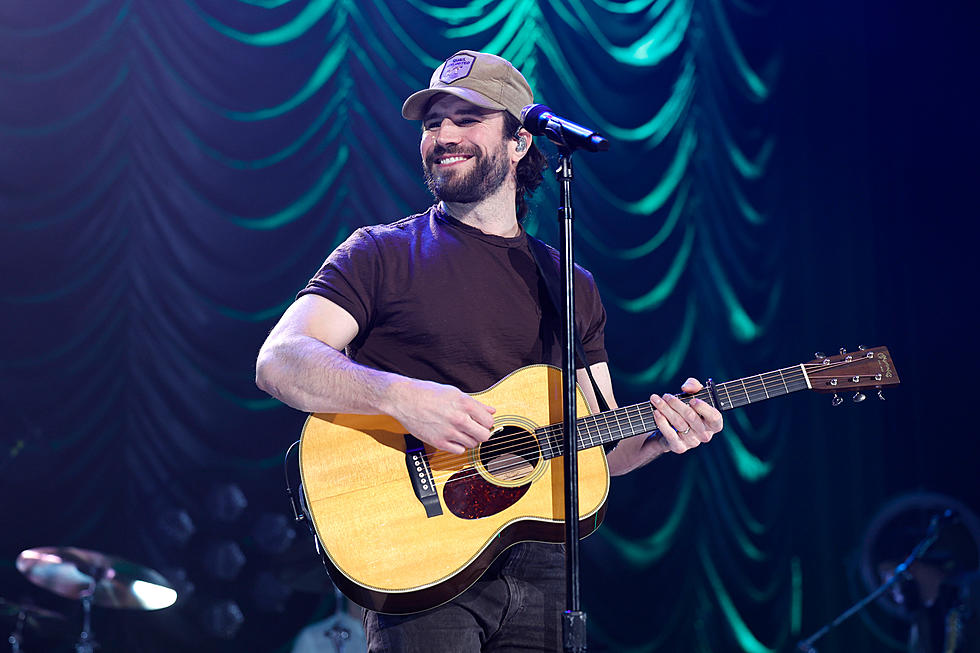![Russell Dickerson: ‘I’m Not Gonna Sacrifice Who I Am’ [Exclusive Interview]](https://townsquare.media/site/204/files/2022/11/attachment-russell-dickerson-interview.jpg?w=980&q=75)
Russell Dickerson: ‘I’m Not Gonna Sacrifice Who I Am’ [Exclusive Interview]
Russell Dickerson name-checks a folk hero, a '90s country staple and a California rock band within a span of a few songs on his new self-titled album. To list their names is to outline a short biography of the Nashville-raised singer and songwriter.
"She Likes It" (Dickerson's Top 20 radio hit with Jake Scott) is where you'll hear him hat-tip John Denver, but elsewhere he refers to Tim McGraw and Third Eye Blind, going as far as to hum a bit of "Semi-Charmed Life" on "I Remember." If you were writing a country song fill-in-the-blank style, you would not chose these three as influences.
"My mom was always listening to James Taylor and John Denver," Dickerson tells Taste of Country. "Obviously I’m a ‘90s kid, so Third Eye Blind was the soundtrack."
Add McGraw to that playlist, as well. These artists help paint an authentic picture of a 35-year-old rising star who is proudly pushing country music's boundaries. The 15 songs on Russell Dickerson (Nov. 4 via Triple Tigers Records) find a man who is coming into his own as a creator. The collection is a remarkably efficient package of hooks and melodies that never include more production than needed (see his radio single) and never repeat the same song twice.
"I feel like songwriting is so instinctual," he says, unknowingly flexing. Part of Dickerson's charm is his humble swagger. He glides into most rooms, somehow seeming taller than the 6 ft., 4 in. description of his height Wikipedia provides. Positive energy radiates from him, but in 2022, that no longer means saying 'yes' to everybody. V3.0 of Russell Dickerson finds the west Tennessee native doubling down on his ideas in the face of what's hot.
Taste of Country: Is there one song on this album that you're very excited to see people react to?
Russell Dickerson: The first one is "Blame It on Being Young," the first song on the album. I’ve been playing that live and the response has just been incredible, honestly. We were actually playing at Faster Horses and my merch guy was walking around and I played this song, just me on acoustic — and you know the festival crowd — everybody's in party mode. But my merch guy was like, “Dude, while you were playing ‘Blame It on Being Young’ I was in the middle. There were three bros, like three dudes with their arms around each other crying.” Honestly, that was like, “OK, something is happening with this song.”
Sometimes when an artist gets to a third album, there’s an urge to go one of two ways: Either to continue pushing the boundaries of the genre, or to bring it back to its country roots. It sounds like you’re more in the genre-pushing camp.
Absolutely. I feel like that’s where I’ve always kind of been. On my first album, “Yours” is a pretty solid down-the-middle country love ballad, but with “Every Little Thing,” that was pushing. I just want to continue that.
Even in the writing rooms for this album, some of my closest co-writers were like “You know, the format’s really country right now. We should do some more country stuff” … I’m not gonna sacrifice who I am.
Did songwriting come easy for you?
I feel like there were aspects of songwriting that came super naturally. The more challenging part for me would probably be the lyrical side. This album was the first one where I actually stood up for myself in these co-writes, like, “That’s just not something I’d say.”
With “Blame It on Being Young,” we were struggling to find a verse direction and I just, after half-an-hour of searching around, kind of picked up the guitar and was like (sings), “We used to tepee all the girls we had crushes on” and boom, we kept spitting out lyrics.
Did growing up near Nashville make this dream seem more attainable?
It really did. I knew I wanted to do this. In college, I’m not hip to the fact that people are riding in off of buses every day trying to come from Georgia, Mississippi, everywhere. I’m like, "I’m right here in Nashville, I’m 100 yards from Music Row at Belmont University.
It just was the culture. I was friends with a bunch of songwriters and artists and we just started writing songs and playing music and started playing out. I met Florida Georgia Line at Belmont. I met Greg Bates at Belmont. It was just that culture.
You’re really good at writing commercial country songs for Top 40 radio. How hard is it to trim a lyric or verse down all the way, which means cutting great lyrics or ideas?
If you look at the notes from songwriting, like in the Notes folder, at the bottom of the page I feel like there’s always some great lines left over. There really is only so much space to fit in the song. I don’t ever look at the time, like, “We need to hit 3:30 or under 3:50.” I just follow the natural instinct of what needs to come next.
What makes Russell Dickerson really angry?
Traffic. Haters.
11 Times Country Stars Called Each Other Out
More From Taste of Country

![See Which Country Stars Went to the 2024 Kentucky Derby [Pictures]](http://townsquare.media/site/204/files/2024/05/attachment-Wynonna-Judd-Thomas-Rhett-Lee-Brice-Randy-Travis-Kentucky-Derby.jpg?w=980&q=75)



![Russell Dickerson’s Big Wheels & Back Roads Tour Looks Like a Party [Pictures]](http://townsquare.media/site/204/files/2023/11/attachment-Russell-Dickerson-Tour.jpg?w=980&q=75)
![Russell Dickerson Has the Zoomies After His Latest No. 1 Hit [Watch]](http://townsquare.media/site/204/files/2023/11/attachment-RussellDickerson.jpg?w=980&q=75)

![Russell Dickerson + Wife Kailey Welcome Second Baby Boy [Pictures]](http://townsquare.media/site/204/files/2023/08/attachment-RussellDickersonKailey.jpg?w=980&q=75)
